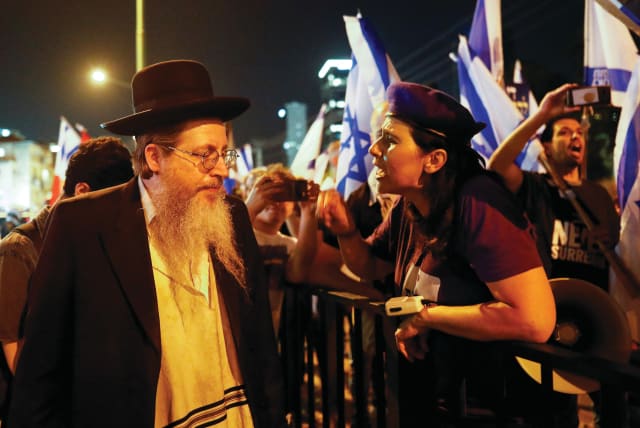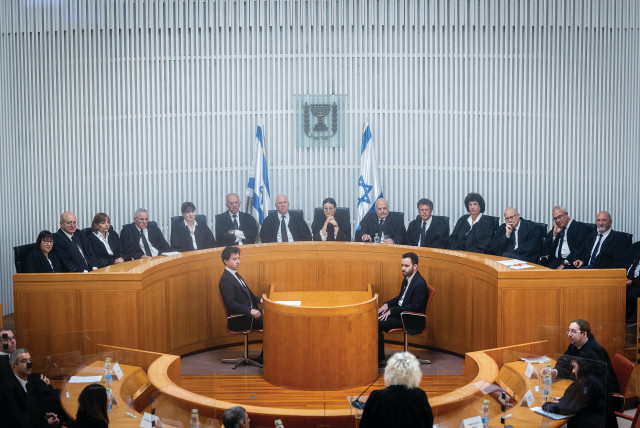'Being a Nation State': Evolution of Israel's Jewish, democratic balance - review

Tensions have moved along two interrelated axes in Israeli society: between Jewishness as a national identity and democracy; and Judaism as a religion and democracy.
Israel is an uncommon kind of nation state.
In its Declaration of Independence and 1992 Basic Laws, Israel defines itself as “Jewish and democratic.” And yet, as Shuki Friedman points out, tensions have moved along two interrelated axes in Israeli society: between Jewishness as a national identity and democracy; and Judaism as a religion and democracy.
In Being a Nation State in the Twenty-First Century, Friedman (the vice president of the Jewish People Policy Institute and law lecturer at the Peres Academic Center) examines these tensions as manifested in challenges to the “status quo” mandates on religion-state issues laid out in David Ben-Gurion’s letter to leaders of the ultra-Orthodox Agudat Israel Party in 1947 and the Law and Administration Ordinance of 1948.
During the last 75 years, Friedman claims, through a combination of court decisions and lobbying by secular organizations, the status quo (and the power of the Chief Rabbinate Council) has “eroded,” “crumbled” and been “eaten away.” He focuses on four key areas: Sabbath observance; regulation of marriage and divorce; legal and religious definitions of conversion to Judaism; and control over kashrut.
How Israel's Jewish-democratic status quo has eroded
Since the 1980s, Friedman indicates, more and more commercial establishments, shopping malls, and cultural and recreational establishments are open on Saturday. And the High Court of Justice in a series of decisions in the 2010s decreed that local authorities could decide whether businesses could be opened or closed: “Alongside the protection of the unique Sabbath, each and every individual must be allowed to shape his Sabbath in his own way and according to his beliefs, and to fill it with content as he sees fit. To borrow from [poet] Zelda, ‘To light candles in every world, that is the Sabbath.’”
Courts have also allowed Israeli Jews to marry abroad; required rabbis to apply the concept of community property to divorcing couples; and granted common law wives the de jure status of all other wives.
In 1970, when Benjamin Shalit, an Israeli naval officer married to a non-Jew, sought to have his children registered as Jews, the Supreme Court ruled in his favor. In response, the Knesset amended the Law of Return to include not only persons born to a Jewish mother but also to anyone “who converted and does not belong to a different religion.” Since the revised statute did not stipulate “converted according to the Jewish law,” it opened the door to applicants who are not Orthodox.
In 2018, relying on another High Court ruling, Tzohar established a private kashrut supervision system, designed to break the monopoly of the Chief Rabbinate. To date, Friedman notes, Tzohar has not been fined.
All that said, Friedman’s analytical framework – the “erosion” of the status quo – does not, in my judgment, adequately explain the challenges and changes in what is “Jewish” in the Jewish state. The status quo was not a detailed blueprint. Indeed, Friedman refers to it as “an imagined reality,” a “magic spell” into which each party saw “whatever it desired.”
Also subject to challenge are his claims that the trend toward erosion is “unequivocal” and that a continuation of the decline in the visibility and status of Jewish religion will make a de facto separation of religion and state “inevitable.”
A compelling case can be made, in fact, that, given massive changes in the Israeli population, the emergence of a new model of “traditionalism,” which does not require diligent adherence to doctrine or practices; and polls indicating that only 20% of Israelis have confidence in the Chief Rabbinate, the ultra-Orthodox have been remarkably successful in retaining substantial power to regulate public and private places and practices.
As Friedman acknowledges, the Knesset authorized local authorities to prohibit the operation of businesses on the Sabbath in 1990. The status quo still remains with regard to public transportation. El Al planes do not fly on Saturday. Roads can be closed when there is a strong religious interest in clearing them. The Rabbinate still holds a statutory monopoly over marriage and divorce. Its monopoly over Orthodox conversions has “been cracked, but not abolished.” And the Rabbinate still imposes strict halachic standards on kosher consumers.
Nor does Friedman mention several important successes of the ultra-Orthodox, such as exemption of haredi Torah students from mandatory military service and substantial government subsidies that allow students to study in yeshiva, marry and have large families while staying out of the workforce.
In a brief conclusion, Friedman recommends a different formula for regulating the relationship between religion and state. He believes it is reasonable and proper for the state to be involved in conversion, marriage and divorce because these activities are essential to the definition of who is Jewish and the preservation of the Jewish community. He suggests that “instrumental religious services,” including kashrut, can be privatized because they do not affect the character of Israel as a Jewish state. For issues related to public transportation and street closings, he advocates balancing a right to freedom of movement with concerns about Sabbath desecration.
Unfortunately, Friedman does not elaborate on this agenda or indicate whether or how it might be implemented. He is surely right, however, that “only a broad coalition of leading politicians and the Israeli public itself can institute such agreements and redeem Israeli society from the fierce struggle that has plagued it since the establishment of the state.”
The writer is the Thomas and Dorothy Litwin Professor of American Studies at Cornell University.
Being a Nation State in the Twenty-First Century
By Shuki Friedman
Academic Studies Press
117 pages; $129
Jerusalem Post Store
`; document.getElementById("linkPremium").innerHTML = cont; var divWithLink = document.getElementById("premium-link"); if (divWithLink !== null && divWithLink !== 'undefined') { divWithLink.style.border = "solid 1px #cb0f3e"; divWithLink.style.textAlign = "center"; divWithLink.style.marginBottom = "15px"; divWithLink.style.marginTop = "15px"; divWithLink.style.width = "100%"; divWithLink.style.backgroundColor = "#122952"; divWithLink.style.color = "#ffffff"; divWithLink.style.lineHeight = "1.5"; } } (function (v, i) { });

